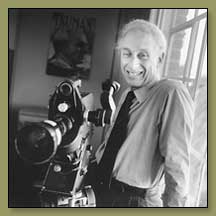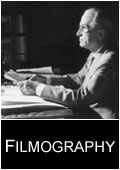
Charles Guggenheim, an internationally acclaimed documentary filmmaker, died on October 9, 2002 after a seven-month battle with pancreatic cancer. Guggenheim was 78 years old.
He dedicated the last six months of his life to completing a film about his fellow Jewish American infantrymen who he discovered had died in Nazi slave labor camps. Berga: Soldiers of Another War, is a film about an unknown and overlooked event in the history of World War II, in which for the first time the story of the American GI intersects with the tragedy of the Holocaust. (photograph by Steve Barrett)
Guggenheim’s career spanned half a century. He made over one hundred documentaries, was nominated for twelve Academy Awards, and won four times. Guggenheim also received the prestigious George Foster Peabody Award for Saturday at the Zoo and three Emmys. He is considered by many to be one of the central figures in the founding and evolution of the American documentary. He was described by film critic Hollis Albert as "probably the most accomplished maker of documentary films in the country."
Guggenheim was also one of the first to create television media for American political campaigns using the documentary style in groundbreaking ways. Starting with the Presidential campaigns of Adlai Stevenson, Robert Kennedy, and George McGovern, Guggenheim went on to shape the campaigns of many of the most prominent senatorial and gubernatorial democratic candidates in the 1960s and 1970s. Unlike the "slash and burn" techniques used in many of today’s media campaigns, Guggenheim simply sought to reveal the character of his candidates in an affirmative way and let the issues speak for themselves. In a speech before Congress, Guggenheim explained why in the early 1980s he had quit the business of political advertising. He said, "If you play the piano in a house of ill repute, it doesn’t make a difference how well you play the piano." Even years after leaving political advertising he often spoke passionately about his hopes that the system would reclaim itself.
Guggenheim established his first production company in St. Louis, Missouri in 1954 where he produced the seminal film about the construction of the St. Louis Arch, Monument to the Dream. This film won the Venice Film Festival’s XI Gold Mercury Award, marking the first time in the Festival’s history that the award was given to an American.
It was in St. Louis that Guggenheim won his first Academy Award for the film Nine From Little Rock, which tells the story of the Arkansas school integration crisis. He later moved to Washington, DC to work with George Stevens Jr., who headed the United States Information Agency (USIA) under Edward R. Murrow.
Guggenheim's second Academy Award came from one of the most tragic and profound moments in his life and career. Robert Kennedy Remembered, a film biography, was made in a remarkable six weeks after the senator’s assassination, in time for the 1968 Democratic Convention. After the film was shown during prime time to a packed convention hall in Chicago, the floor was brought to a standstill for more than an hour while the delegates mournfully demonstrated their sorrow and affection for RFK.
The third Academy Award went to The Johnstown Flood, a film commemorating the 100th anniversary of the famous disaster.
His most recent Academy Award was received in 1995 for A Time for Justice, a film about the Civil Rights Movement.
Guggenheim’s films about architecture, which include Monument to the Dream (depicting the building of the St. Louis Arch), The Making of Liberty (the story of the birth and restoration of the Statue of Liberty), and A Place to Be (documenting the design and construction of the National Gallery of Art), won him the 1987 Institute Honor from the American Institute of Architects.
Guggenheim produced two feature films, including The Great St. Louis Bank Robbery (1959), featuring the young unknown actor Steve McQueen and feature editor Dede Allen.
He was commissioned by three presidential libraries to produce the film biographies of Presidents Kennedy, Johnson and Truman. They are on permanent exhibition in Boston, Massachusetts; Austin, Texas; and Independence, Missouri.
Despite all of Guggenheim’s acclaim, he pursued his work with a quiet, intense, and almost private single-mindedness. He developed an unadorned style in his films that seemed to be a reflection of his own personality. In his more recent films, such as the Academy Award nominated D-Day Remembered, Guggenheim began to explore history from the singular point of view of the individuals who experienced it. The struggle and humanity of a few individuals thrown into harrowing circumstances beyond their control was a story that interested Guggenheim the most. This was a theme that would lead him towards his most personal film of all and his last.
Berga: Soldiers of Another War, will be the first film, in fifty years of directing and producing, in which Guggenheim included himself in the telling of the story. Many of the American soldiers sent over to fight in the Battle of the Bulge were from his 106th Infantry Division. He could have shared their fate if he were not injured in basic training. In his narration he remembers quietly, "They went overseas, and I didn’t. And some of them didn’t come back. And I’ve been thinking about it for fifty years, wondering why it didn’t happen to me. And that’s why I had to tell this story."
Guggenheim’s cancer subjected him to prolonged and debilitating suffering. His struggle to complete the film after he had been diagnosed with cancer was monumental and he exhibited the same dignity as the men he had revered.
No matter what the subject of Guggenheim’s films, be it an important monument, historical event or social issue, at the heart of every story lies the heroic struggle of everyman–and Guggenheim’s belief that there is dignity in that struggle.
Guggenheim has won two Career Achievement Awards, one from the International Documentary Association (2000), and one at the Full Frame Documentary Film Festival (2003), which awarded the first Charles E. Guggenheim Emerging Artist Award. The Charles Guggenheim Symposium Award was also instituted in his honor for the first time at the 2003 Silverdocs: AFI/Discovery Channel Documentary Festival.
Guggenheim was a guest lecturer at Harvard’s Loeb Fellowship in Advanced Environmental Studies, as well as a fellow at both Harvard and Yale Universities. He was a member of the faculty at Harvard’s Salzburg (Austria) Seminar in American Studies and received Honorary Doctorate Degrees from Washington University in St. Louis and from American University in Washington, DC.
Guggenheim served as President of the Foundation for the National Archives. He was a Trustee of the Danforth Foundation, and Director Emeritus of the White House Historical Association's Board of Directors.
He was a member of the Writers' Guild of America, the National Academy of Television Arts and Sciences, and the Academy of Motion Picture Arts and Sciences.
His other miscellaneous awards include:
Conservation Service Award – The United States Department of the Interior 1968
Distinguished Achievement Award - The University of Iowa 1975
The Speech Communication Association Honors 1975
Certificate of Merit – Government of the District of Columbia 1975







